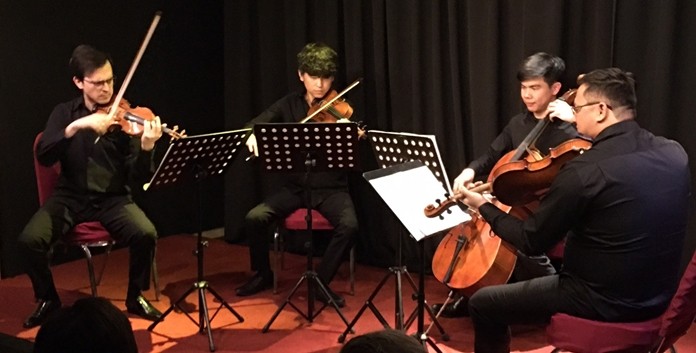
TPO String Quartet
One of my friends is an experienced and successful flute teacher who always encourages her students to look out for “magic moments”. Of course, she’s not referring to the Canadian vodka of the same name, or even the 1950s song by Burt Bacharach but to those fleeting occasions in music which can bring a frisson of excitement or even a tingle down the spine. The expression came to mind at a recent concert given by the TPO String Quartet, so-called because the musicians are members of the Thailand Philharmonic Orchestra. Led by Omiros Yavroumi, the Concertmaster of the TPO, the quartet has something of an international quality. Omiros himself is Greek, Chanasorn Chantarapaoraya (second violin) is Thai, Aibek Ashirmatov (viola) hails from Uzbekistan and Sarai Arsa (cello) was born in Japan.
The programme opened with Haydn’s String Quartet in C major, Op. 76, No. 3. It dates from the late 1790s and has acquired the nickname “Emperor” because the second movement is based on Haydn’s anthem, God Save Emperor Francis. Once the unofficial anthem of Austria, it is now the national anthem of Germany.
The TPO quartet gave a fine account of the work and seemed to capture the essence of the music. I was struck by their attention to detail, the excellent sense of ensemble, the finely-judged dynamics and the careful phrasing. The slow movement has a wonderful closing section with surprising dream-like harmonies and the players really captured the timeless beauty of the music. It was one of several magic moments of the evening. Their performance of the Minuet had a fine sense of rhythm and the Trio section was beautifully judged. The last movement develops into a bustling musical exchange between the instruments and contains some tricky passages that require a high degree of technical skill. The players navigated the movement splendidly and confidently.
Mendelssohn’s Quartet in A minor, Op. 13, No. 2 was written when he was only eighteen but is not short of musical challenges. It dates from 1828, a few months after the death of Beethoven. The opening phrase even sounds like Beethoven and it’s a quotation from Mendelssohn’s song Ist es wahr? (“Is it true?”) composed a few months earlier. There are references to it throughout the work. The TPO performed this lyrical opening faultlessly with a fine sense of phrasing and dynamic control. I especially enjoyed their performance of the second movement, the opening of which was beautifully timed with lovely rich tone quality: yet another magic moment.
The mysterious melody of the third movement was played splendidly by Omiros Yavroumis to a lilting rhythm of pizzicato strings. The scampering middle section seemed to evoke the exotic world of Mendelssohn’s Midsummer Night’s Dream and was brilliantly performed with a superb lightness of touch and splendid articulation. The powerful last movement work was given a fine performance and the final appearance of the Ist es wahr? theme was especially poignant and heart-felt. A magic moment indeed. The quartet’s expressive playing of Elgar’s Salut d’amour made a fitting and reflective conclusion to a splendid concert.
 |
 |
 |





